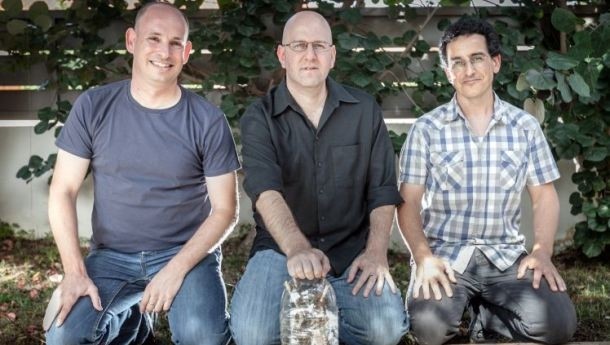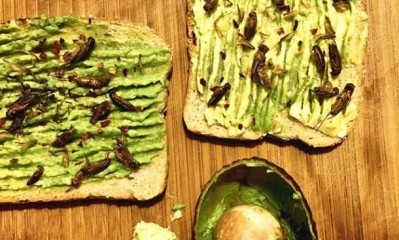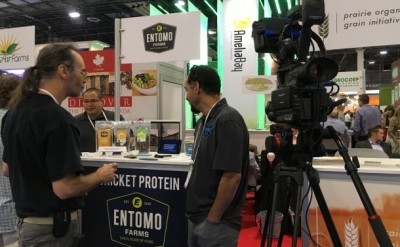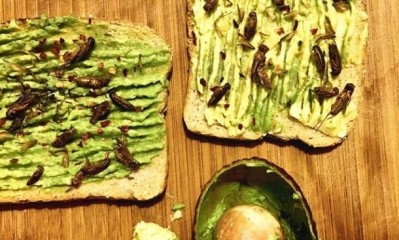Crickets aren't the only game in town when it comes to edible insects, says Hargol FoodTech

Speaking to FoodNavigator-USA during a press trip to Israel organized by the Israel Export Institute, co-founder and CEO Dror Tamir said grasshoppers had several distinct advantages over crickets as a food ingredient.
“First, there’s efficiency of farming,” claimed Tamir, a serial entrepreneur raising grasshoppers in Elifelet in northern Israel.
“Grasshoppers' tendency to swarm making them a better fit for intensive farming. With this quality and with our innovative cage infrastructure we can grow them vertically under better sanitized conditions, with better control of ventilation and humidity and at a higher density. This results in about 10 times more biomass per square feet we can grow annually.”
Neutral flavor
From a flavor perspective, meanwhile, grasshoppers have a blander, and less distinctive taste than crickets, making them more appealing to food formulators, he claimed: “Grasshoppers are almost neutral in taste and flavor.”
From a nutritional perspective, meanwhile, “Grasshoppers contain 20% more protein than cricket with more than 72% whole protein," he claimed. “They do not contain saturated fat or cholesterol, and they also contain omega-3, iron, zinc, folic acid and more.”
Another distinct advantage grasshoppers have over crickets is that they are both Kosher and Halal, he said: “Grasshoppers are the only kosher and halal insect in the world. They are mentioned as kosher in Leviticus.”

Hargol FoodTech is about to close a financing round that will take it beyond $1m in funding.
Its investors include "The Trendlines Group from Israel, Sirius Investment from Singapore and new investors from the USA which we will disclose after closing the round," says CEO Dror Tamir.
Feed options
Right now, Hargol FoodTech (formerly known as Steak TzarTzar) is feeding its grasshoppers organic wheat weed, but is also researching alternative options “that will yield higher nutrient content at a lower production cost, and we already see very promising results,” he added.
The production process is simple, meanwhile: “We dry the grasshoppers and then mill them into fine powder with no chemicals or other processing involved.”
Asked about pricing, he said: "We are providing a product with over 20% more protein than cricket powder and that is unique. Our pricing will take into consideration both factors. We will disclose it in Q2 2017."
"There a huge difference between different grasshopper species. We already have the ability to commercialize three different grasshopper species. At launch, however, we are focusing on a single species. We will commercialize other species at a later stage, where each will bring new advantages to consumers, from taste and flavor to nutrient content."
Dror Tamir, CEO, Hargol FoodTech
North American focus
So what’s the business model? Selling ingredients, or developing its own branded CPG products?
Right now, said Tamir, the focus is selling milled grasshopper powder to food manufacturers, while the company is also collaborating with manufacturers to co-develop innovative grasshopper protein based products and “may consider mutual branding as our ingredient is unique.
“Right now we are b2b-focused with several food manufacturers waiting for us to fulfill orders. We are targeting North America's market, but we may also consider selling to consumers at a later stage."
We'll start generating revenues in Q2
He added: "We will start generating revenues in Q2 2017. Several companies already signed agreements and are waiting for us to provide.
"In the long term, we also have plans to establish grasshopper farms in Africa. Since grasshopper farming is challenging (we are the first to reach commercialization), we have to control every aspect of it at the moment and can do it better when farms are closer to us in Israel. This leads us to the focus on supplying milled grasshoppers to food manufacturers in North America.
"Pet food is also of interest as pet food manufacturers are looking for healthier alternatives and are exploring insect meal."






















